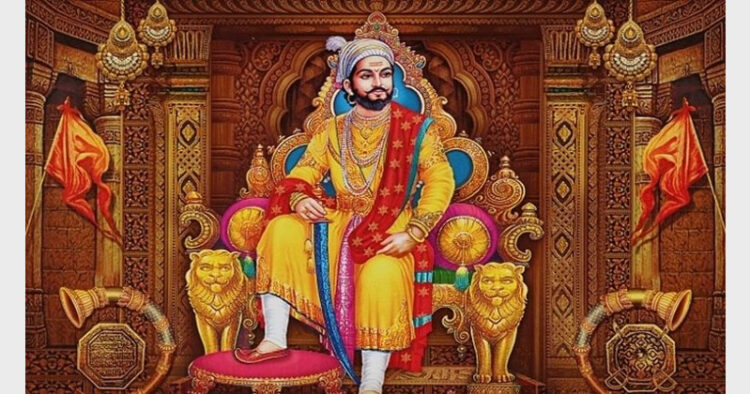Shivaji Raje lived an epic life that captivated the imaginations of both friends and foes. His dazzling victories and ever-ready smile made him the soldiers' idol.
It's time to remember a great warrior and a leader on his Birth Anniversary who possessed exceptional qualities that no one else could match; powerful, pious, pioneer, perseverant, passionate, performer, practical, proactive, pure, and patient are some of them.
When Hindus had lost confidence, hope and developed a depressed mindset, it was Shivaji Raje who resurrected the fighting spirit and raised an army to liberate the empire from Mughal invasion. The rise of Hindutva was relaunched by a pious and powerful warrior who led the fight against invasion, injustice, exploitation, and women's safety.
Jijamata raised him since childhood with a clear understanding and direction to establish "Hindavi Swarajya" to safeguard and uplift the Great Sanatan culture and restore glory. He was raised with Mahabharata and Ramayana teachings and spent a lot of time with great saints learning to fight with different weapons from great warriors like Dadaji Kondadev. Chhatrapati Shivaji Maharaj carried out the first surgical strike at Lal Mahal.
Aurangzeb sent his Mamujan Shaistekhan to Deccan to capture Lal Mahal in Pune. In the following three years, he could only capture Chakan fort, and that too in three years. Shaistekhan was afraid to approach Chhatrapati Shivaji Maharaj because he feared suffering the same fate as Afzal Khan.
He desired to bring Raje Shivaji with no preparation and arms. Due to his Spy Network, Raje Shivaji was well aware of this tactic and was well-versed in all information regarding Lal Mahal's whereabouts. On the contrary, he was doing nothing but causing a nuisance. This compelled Raje Shivaji to launch a decisive Commando-style Surgical Strike to throw him out for Swarajya.
Following events was the epitome of Shivaji Raje's bravery. First and foremost, Shivaji Raje was well aware of the dimensions and dominions of Lal Mahal, having spent his early childhood days there. Still, Maharaj spent time planning and paying attention to even the smallest details, explaining each and assigning tasks to each and every one based on his skill, which shows the quality of a great and dynamic leader.
Broad vision and leading from the front
Previously, Raje Shivaji had blocked Kartalab Khan's road in the Sahyadri Ghats and obtained the wealth as well as the uniforms of their soldiers. Here is the untold vision of Maharaj and planning to perfection. He was aware that soldiers' uniforms would be required to enter Lal Mahal.
Second, he could have chosen not to enter the Mahal and strike. Maharaj could have delegated the task to anyone, but he set an example of leading from the front because he had complete faith in his spy network and was confident in completing the task all by himself.
Third, there was planning, execution, and bravery, but making a trademark signature of fooling the enemy by diverting their attention was a trademark swag of Raje (as evident in Panhala escape, Agra escape, Bahadurkhan loot etc. etc.). To divert attention, Maharaj had gathered a stock of bullocks with two Mashals tied to their horns, which would be lit once Maharaj had completed the task and fled.
On one occasion, Shahaji accompanied his son to the court of the Sultan of Bijapur. Raje Shivaji was only twelve years old at the time. Shahaji saluted the Sultan three times by touching the ground. He instructed his son to do the same. But Raje Shivaji only took a few steps back. He stood tall and straight, with his head unbent. His dazzling eyes seemed to carry his determination that he would not bow down to a foreign ruler. He walked back from the court with the gait and bearing of a lion.
When Shivaji Raje was 18 years old, he took the oath at Rohedeshwar Temple to establish a nation of natives, saying it was God's will. Over the next 35 years, he lived an epic life that captivated the imaginations of both friends and foes. His thrilling adventures have inspired generations of young people.
Raje Shivaji possessed the magnetism of a born leader and cast a spell on all who knew him, attracting the best elements of the country to his side and commanding the most devoted service from his officers. His dazzling victories and ever-ready smile made him the soldiers' idol. One of the main reasons for his success was a royal gift for judging character. In the age of Aurangzeb, his light cavalry, bolstered by swift-footed infantry, was unstoppable.
Raje Shivaji taught the people of India to hold their heads high, develop self-confidence, and face foreign invasions with courage. He emphasised native talent, strict discipline, and concern for peasants, women, men, and children. Raje Shivaji's private life was marked by a high moral standard. He was a devoted son, a caring father, and a caring husband.
When British rule began, leaders and revolutionaries such as Lokmanya Tilak, Subhash Chandra Bose, Dr Keshav Hedgewar, Rabindranath Tagore, and Veer Savarkar drew inspiration from a three-hundred-year-old figure known as Chhatrapati Shivaji Maharaj. Furthermore, during World War II, when recruiting soldiers in India, the British used the image of Raje Shivaji to entice men to join the army!!
This attachment of people to their beloved king, generation after generation, is the most distinguishing factor that sets Raje Shivaji apart from the rest of history's greats.














Comments